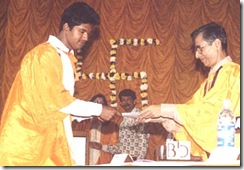[ad]
The college fest (or University, or faculty fest) that is held at Jadavpur University is, perhaps, unlike any other. Unfortunately one cannot use words of high praise while describing this fest, which is rather unique for some unfortunate reasons. While in other college fests the student attendance increase, here at JU, it decreases. Reasons could be many, and my guesses would include:
- In Jadavpur University at least three fests are organised by the three faculties in the University – all of them called Sanskriti, by a peculiar Bengali chauvinism. Thus within the short span of about one month during the winter fest season we have three Sanskritis organised by the Engineering Faculty, the Science Faculty and the Arts Faculty. Needless to say that besieged by such profusion of festivals, the student loses interest and attachment in such events.
- The sense of belonging towards an institution that is evident in other places is miserably missing in this university.
- The events are held in such lacklustre fashion, and feeds upon such monotony of tradition and dull imagination, that the student cannot be held culprit if the events deny any temptation.
- Except for the Engineering Sanskriti, which receives rather heavy patronage from the corporate world, the events lack sponsorship and are thus dull events. The onus of attracting sponsorship lies, however, with the organisers.
- The event is held over a three-four day period. The interest is thus dissipated.
- This year the Sanskriti (organised by the Arts Faculty) has been staged at the Open Air Theatre (OAT) which is situated at the fag end of the campus. It loses out on patronage from the Engineering students who have their classrooms at the other end of the campus.
- In general the JU students are very unexcitable.
It wasn’t surprising, therefore, that we found so little reason to disturb our daily routine at college, and introduce such a shoddy and lacklustre event as Sanskriti into our consciousness. However, I found reason enough to go the the OAT. This is the first time in my stay at the University that the fest had been organised at this spot, and naturally there was curiosity as to how it looks. But the real tempter was the Choreography competition. For as long as I have witnessed Sanskriti, I have always felt that the most popular event is the Choreography competition. One gets to see all the beautiful and talented girls of the university dancing on the stage, and if one remembers that all girls worth watching are in the Arts Faculty, then it becomes crystal clear why the event goes house full.
[ad]
For the last three years (if my memory does not deceive me) three girls from our class have been winning the event. Their dance had attained a very predictable feature, and one could guess extra-meritorial considerations coming into play- all the girls were popular, extremely vivacious, and beautiful. This year as well three girls came on the dance floor- the same winning combination, with one player being replaced. The introduction saw the incantation of an incomprehensible mantra which nobody could make a sense of (keep in mind, they were from the English Department), a feature which had been used the previous year as well. And then the surprise package- the very popular dance number Jiya Jale from the film Dil Se was played in Tamil, instead of in Hindi- God knows why! It would be inappropriate for me to comment anything upon the quality of the dance, but it was rather interesting for reason which cannot be specified here. And that one of them danced a lot better than the other two was more than perceptible.
Honestly, the most enjoyable number was given by a group of seven guys from the Economics department. The best number was given by a male female duo who danced with the Bengali song ‘Kono ek gayer bodhu’. But, as far as I am concerned, the most interesting number was given by the girls from our class. True, one of them stumbled at the fag end; true, they could not repeat the previous three years when they won the event, but they did well to step upon the stage. Perhaps participation is more important than winning, and more so when you don’t have to prove anything, when you have already proved your credentials.
Technorati Tags: Jadavpur University,JUDE,Sanskriti,College Fest
[ad]

